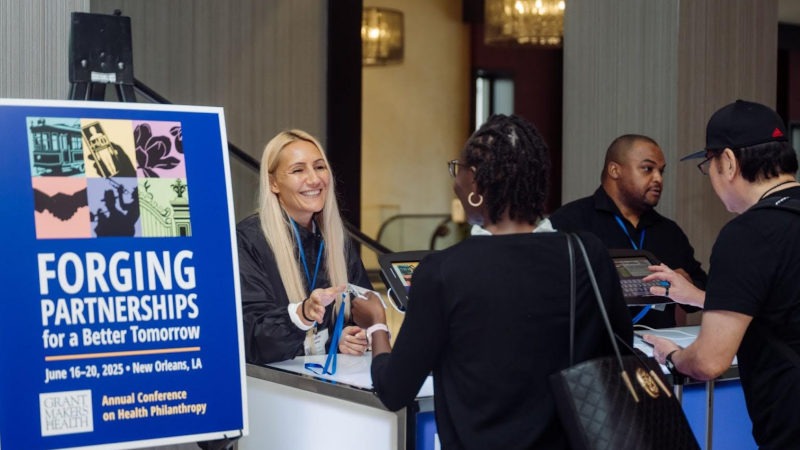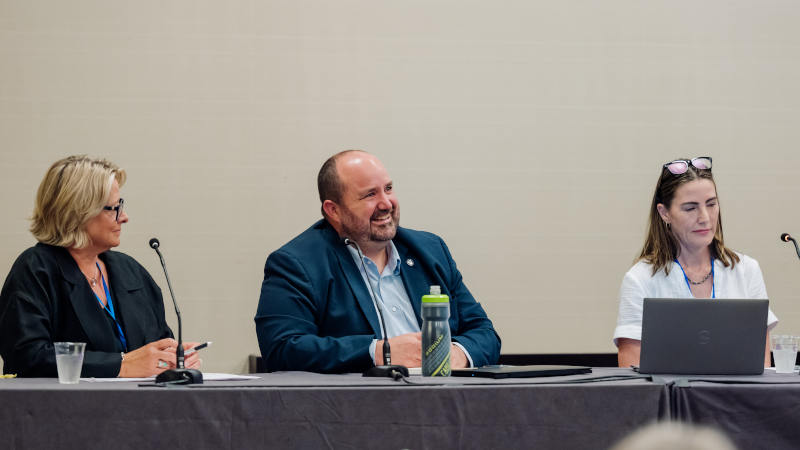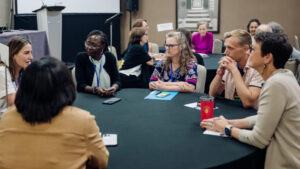
The Grantmakers In Health Annual Conference pre-conference sessions kicked off today in New Orleans, a city rich in resilience and spirit. Nearly 20 years since Hurricane Katrina, we gather to be inspired by the partnerships that supported communities two decades ago, and the ones that we are forging for the road ahead.
The GIH Annual Conference on Health Philanthropy has always been a site of learning, connection, and growth, and this year will be no different. Take these next few days to ask tough questions, talk to new people, and consider how we navigate the current health philanthropy landscape together
Session Spotlight: Protecting the Public’s Health: Strategies for Building a Healthier Information Ecosystem
Access to timely, accurate science and health information has never been more critical. Trust in information is declining, and the media landscape is changing rapidly. Today’s pre-conference session outlined strategies funders can apply to build a healthier information ecosystem and trusted relationships with media and communities.
The Challenges and Opportunities in Building a Healthier Information Ecosystem
Stefanie Friedhoff, Co-Founder of the Information Futures Lab (Brown University School of Public Health), opened today’s session with two questions: What comes to mind when you think of the challenges facing today’s information ecosystem? What are the opportunities? Attendees identified misinformation as the most significant challenge, but felt inspired by the possibilities in community engagement and collaboration.
While misinformation, disinformation, and conspiracies are part of the problem, we have to look deeper at what people experience when they seek clear, accurate information. People look for facts, clarity, and community, but are often confused by conflicting information. Friedhoff suggested that this is an “information crisis” more than a misinformation crisis, and shared that persistent barriers to free and accessible information, complex and jargon-filled information, and prioritizing facts over relationships can exacerbate the problem.
Bottom line: We need to build infrastructures of trust. People are asking new questions, which should fuel funders and communicators to listen. Some opportunities to strengthen the health and science information ecosystem include:
- Investing in collaborations across local health information ecosystems.
- Supporting capacity and skill-building for diverse creators and navigators of trusted information.
- Moving past information to support accountability efforts at the top, and support narrative approaches that offer ongoing sensemaking in communities.
- Investing in efforts that focus on dialogue and “big tent” support for health.
- Incentivizing practitioner-research partnerships, so research is relevant, community-led, and measures what matters and what works.
Emerging Trends in Misleading Information and Public Trust
Irving Washington, Senior Fellow (KFF), leads KFF’s Health Information and Trust Initiative, which tracks the spread of health misinformation through The Monitor. Like Friedhoff, he noted that misleading information is part of the problem, but also how people perceive it. Research indicates that most people want something to be done about misinformation, but don’t always agree on what misinformation means. This “malleable middle” is engaged but navigates information with caution and, often, confusion. However, as Washington noted, “Uncertainty does not mean apathy.”
Funders and communicators are caught between this growing confusion, declining trust in health institutions, and increasing urgency. How do we meet this moment without adding more noise to the landscape? Washington offered opportunities to build trust, including:
- Addressing deeper beliefs. Focus on why narratives resonate, not just whether they are true.
- Meeting uncertainty with empathy. Most people are not misinformed; they are unsure.
- Using risk and benefit framing. People want transparency more than certainty. Explain how decisions are made and how evidence evolves.
- Supporting trusted messengers. Equip doctors, community leaders, and local media with information.
Practical Tools for Communicating About Public Health
Nalini Padmanabhan, Communications Director (de Beaumont Foundation), agreed that trust in public health institutions and guidance is declining. This distrust is amplified by a limited understanding of public health concepts and a lack of shared language in public health.
What is public health? What do public health workers do? How do public health activities benefit individuals and communities? Driven by these questions, de Beaumont conducted extensive research and recently released a corresponding tool, Communicating About Public Health: A Toolkit for Public Health Professionals, that offers a path to communicating clearly and effectively about public health to build understanding and trust.
The research yielded five key concepts that people often do not understand, but are essential to showcasing the value and importance of public health:
- Public health works at the community level.
- Public health focuses on prevention.
- Public health workers are local.
- Public health workers play many roles.
- Public health benefits everyone.
To communicate effectively about these concepts, Padmanabhan encouraged attendees to ground messaging in what they know, consider systemic issues that may shape an audience’s worldview, and highlight opt-in services like health screenings. While words matter, trust is built by truly understanding and empathizing with the people you are communicating with.
Panel Discussion: Media Strategies for Authentic Communication
Following the presentations, Dale Anglin, Director (Press Forward) moderated a rich discussion about building trust between philanthropy and media. Right now, healthcare foundations want to get information out to their communities, the media is losing audiences, and community-based groups want people to get free and fact-based information. This moment requires radical collaboration to meet what is essentially the same goal across all groups: getting accurate, timely, evidence-based health information to communities.
Each speaker highlighted collaboration as key to authentic communication. David Jordan, President and CEO (United Methodist Health Ministry Fund) hosts the Pioneers in Health podcast, which has shaped the conversation around health in Kansas. Podcasting offers a way to give voice to the work of grantees and the community without feeling overly produced.
Christina Thompson, Director of Communications (St. David’s Foundation), highlighted a similar success story: Health Talk, a listener-driven radio program hosted by a local county medical authority on KEZI, the oldest radio station in Austin. While the collaboration required deep listening, learning, and exploring, it yielded trusted, community-informed media.
Brenda Sharpe, President and CEO (REACH Healthcare Foundation) emphasized that partnerships are essential sources of inspiration: “If a trusted colleague calls you with a wild idea, say yes.” By saying yes, Sharpe noted that any foundation, of any size, has the opportunity to be a trusted partner.
At the close of the session, panelists offered actionable ways for funders to build radical collaboration across philanthropy, media, and community:
- Ground your work in research and data.
- Communicate with confidence and know your messaging.
- Build relationships today. Relationships with the media should be year-round, and not just when you need them.
- Don’t be afraid to try. You may fail, but remember that no one has partnerships figured out perfectly.
- Be okay with moving out of the driver’s seat. Success means the message has gotten to your community thoughtfully, not that the foundation led the initiative or was mentioned in an article.
- Admit when you have missed the mark.
All GIH Annual Conference sessions are designed to encourage learning, connection, and growth. After the dynamic presentations and panel discussion, attendees joined speakers and panelists to discuss themes that emerged during the session. These rich discussion groups sparked new ideas and important connections. This conference week, do not hesitate to jump into new conversations and forge partnerships that prioritize trust and authenticity.
This pre-conference session was supported by Eyes On Health and the Robert Wood Johnson Foundation
On the Ground
“Partnerships are critical. The challenges are daunting. By working together, we can have more of an impact.”
—David Jordan, President and CEO, United Methodist Health Ministry Fund

NOLA Facts: New Orleans is fondly known as “The Big Easy.” Inspired by New York City’s nickname, “The Big Apple,” the name recognizes New Orleans’ laid-back and spirited lifestyle.
Follow all the conference activities on GIH socials and the official GIH Annual Conference app.
Facebook | LinkedIn | Instagram | Conference App

